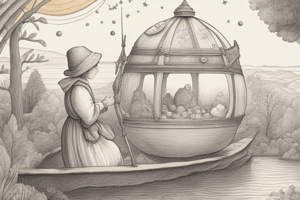Podcast
Questions and Answers
Which type of planets are primarily made of helium and hydrogen?
Which type of planets are primarily made of helium and hydrogen?
- Gas giants (correct)
- Ice giants
- Dwarf planets
- Terrestrial planets
Among the terrestrial planets, which planet is the hottest?
Among the terrestrial planets, which planet is the hottest?
- Mars
- Venus (correct)
- Earth
- Mercury
Which planet in our solar system is the smallest and closest to the sun?
Which planet in our solar system is the smallest and closest to the sun?
- Mercury (correct)
- Jupiter
- Venus
- Mars
Which planet in our solar system is famous for its rings?
Which planet in our solar system is famous for its rings?
What is the common composition of ice giants like Uranus and Neptune?
What is the common composition of ice giants like Uranus and Neptune?
Which planets in our solar system are known as Jovian planets?
Which planets in our solar system are known as Jovian planets?
What percentage of stars in the galaxy have planetary systems?
What percentage of stars in the galaxy have planetary systems?
Which star cluster in the Milky Way galaxy houses our solar system?
Which star cluster in the Milky Way galaxy houses our solar system?
How many known solar systems are there in the Milky Way galaxy?
How many known solar systems are there in the Milky Way galaxy?
What caused the formation of our solar system about 4.5 billion years ago?
What caused the formation of our solar system about 4.5 billion years ago?
Flashcards are hidden until you start studying
Study Notes
- Our solar system is one of over 500 known solar systems in the Milky Way galaxy.
- The solar system came into being about 4.5 billion years ago, following the collapse of a cloud of interstellar gas and dust into a solar nebula.
- The solar system is located in the Milky Way's Orion star cluster.
- Only 15% of stars in the galaxy have planetary systems, with our sun being one of them.
- The solar system consists of eight planets.
- The first four planets, Mercury, Venus, Earth, and Mars, are called Terrestrial planets, primarily made of rocky material with solid surfaces and no ring systems.
- Mercury is the smallest and closest to the sun, having the shortest orbit.
- Venus is the hottest planet with temperatures reaching up to 867 degrees Fahrenheit.
- Earth is the only known planet to sustain life.
- Mars might have supported life about 3.7 billion years ago when it had a watery surface and moist atmosphere.
- The last four planets, Jupiter, Saturn, Uranus, and Neptune, are called Jovian planets, predominantly made of helium and hydrogen.
- Jupiter and Saturn are gas giants with multiple moons, ring systems, and no solid surface.
- Uranus and Neptune are ice giants with rock, ice, and a liquid mixture of water, methane, and ammonia.
- All Jovian planets have multiple moons, ring systems, and are immense.
- Jupiter is the largest planet in the solar system.
- Saturn is famous for its rings, which are wide enough to fit between Earth and the moon but are barely a kilometer thick.
- Uranus is the seventh planet and is famous for rotating on its side.
- Neptune is the eighth and outermost planet and is also one of the coldest.
- The asteroid belt, a flat disc of rocky objects, orbits the Terrestrial planets.
- The Kuiper Belt, a disc of space debris, orbits the Jovian planets and is home to dwarf planets and the birthplace of many comets.
- The Oort Cloud, a vast, spherical collection of icy debris, is considered the edge of the solar system.
Studying That Suits You
Use AI to generate personalized quizzes and flashcards to suit your learning preferences.





